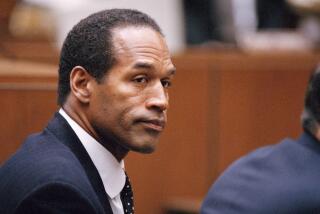Alvin Poussaint: Upbeat About the Black Psyche
- Share via
The accusation came just as the press conference at the Hollywood Roosevelt was winding down.
“My God, you’re talking optimism!” a man blurted out, half in jest, to black psychiatrist Alvin Poussaint of Harvard Medical School.
The awardees of the 1988 Medgar Evers Community Service Awards of the Beverly Hills/Hollywood NAACP had been introduced to a roomful of journalists, almost all of them black, and the majority of the questions had gone to Poussaint, the medal of honor recipient.
He was to speak at the luncheon that would follow on “the state of the psyche of black America” and his responses to the many questions about the impact of the Jesse Jackson campaign on that psyche had been positive:
“I think it’s had an incredible impact, carrying the black psyche up to a much higher level. . . . It’s important to go for it, even when the odds are stacked against it. They’re always telling him it’s not the right time. It wasn’t the right time for Martin Luther King either. . . . (Jackson) did it. He made it work. He proved the polls wrong, the analysts wrong. He has made significant inroads as a candidate into white America.”
Poussaint went on to talk about the psyche of white America. A script consultant to “The Cosby Show,” he reminded the group that early marketing polls had doomed the show before it started by concluding that white America wouldn’t go for it--”it” went on to become the No. 1 show in the country. And now the polls had been wrong about whites and Jackson--one-third of those who voted for him were white.
“We don’t know what they’ve been thinking. Those TV shows have been changing the white psyche,” he said, thus bringing on the exclamation about optimism.
Fighting Words
Those could be fighting words in today’s cynical world--right up there with naivete, or even ignorance.
“I don’t know if optimism is quite the right word,” Poussaint said later in the day, relaxing in his suite after the luncheon.
“I believe in movement. You can make things happen,” he said, repeating Jackson’s success as a case in point--”damned impressive with the baggage he has to carry around.”
He called what has been happening a “crack in the armor” of white Americans who are not as rigidly wedded to the stereotypes of the past:
“They’re ready to be more open, not to shut out. They didn’t flip out when Vanessa Williams won Miss America, and they didn’t flip out when she went down, saying ‘all black people are corrupt.’ (Their response) was more like, ‘that’s sad.’
Despite the fact blacks are still far behind, he said, there is now “probably triple the talent” and resources there was 25 years ago: “Just look at the people the Ivy League alone is turning out.”
White Americans, he added, are becoming used to seeing black middle-class people and accept blacks as heroes, thanks largely to their success in sports and music.
“Look how respected William Gray (the black Democratic congressman from Philadelphia who heads the budget committee) is. There has been a dramatic change in the way whites think about the ability of blacks to govern and run things. It’s due to the black mayors. Twenty years ago they would flee the city. . . . Now there are black school superintendents, police chiefs. It’s changed the public image.”
There are even inroads in the white male bastion of corporate America, he said, at least among progressive companies.
“Within corporations, a lot of blacks are organizing and some corporations encourage it. They see it as a way to deal with problems and issues, not as a threat.”
If Poussaint was speaking positively, it was not because a quick flash came to him through rose-colored glasses. The author of “Why Blacks Kill Blacks” knows well and personally the incredibly long hard road on which any forward movement has happened. A Harlem boyhood behind him, he may have had degrees and titles from Columbia, Cornell and UCLA by the time he served as Southern field director of the Medical Committee for Human Rights in Jackson, Miss. during the height of the civil rights movement, but his status served only to inflame a confrontation with a local cop in 1965.
“ ‘What’s your name,’ ” Poussaint recalled being asked.
“ ‘Dr. Poussaint.’ ”
“ ‘No, I want your first name, boy,’ ” Poussaint said, smiling faintly.
When he says, “I think here has been overall forward movement,” it is an observation he roots in history, starting with an explanation of the psychologically and physically brutalizing effects of slavery and segregation on black people and their psyches. The early movement forward was just to get the basics of human dignity--the seat on the bus or lunch counter, the access to schools--”at least legally.” Next he said, in the late ‘60s, it was the emergence of the black consciousness movement--black power and black pride, ridding black people of the negative feelings of being black.
“And then an amazing thing happened around 1968 and ‘69,” he said. “Along came Shockley and Jensen.” (Physicist William Shockley and educational psychologist Arthur Jensen published research widely interpreted to assert black genetic inferiority.)
“You had to ask, ‘why is this happening now, just when blacks are embarking on a movement to increase black pride,” Pouissant said.
Nor have recent setbacks suffered during the years of the Reagan Administration helped, he said. Overall progress in white attitudes has coexisted with a re-emergence of racism among those “hard-core racists who feel it is now safe to surface,” he said, pointing in part to attacks on affirmative action, ethnic slurs from highly placed officials, and the lack of blacks in the Reagan Administration.
“(Former President Jimmy) Carter had such a high visibility of blacks involved. There was a feeling blacks were in the immediate circle. When Ronald Reagan got in, that all changed. Even worse, he seemed to pick anti-black blacks.”
The recent uproar in New York that has arisen over the Tawana Brawley case points to the persistence of racism in society and the gulf of mistrust that exists between blacks and whites, he said. The case, involving a young black woman who claims to have been raped and otherwise abused by a group of white men, including a law enforcement officer, has been thrown into a state of upheaval by her three black advisers--a minister and two lawyers. Declaring that she cannot get justice, they are advising non-cooperation.
“The most important thing emerging is the support these lawyers have in a certain portion of the black community,” he said. “What they say may not apply to Tawana Brawley--we don’t know--but it is close to impossible for any black to get justice in New York City. . . “
They are using the Tawana Brawley case as an attack on the whole criminal justice system. . . . (Gov. Mario) Cuomo and (Mayor Ed) Koch had better be concerned about the high level of distrust in the black community.”
The luncheon, which honored local community leaders for their service and achievement and also featured entertainment by the young winners of the organization’s ACT-SO program (Afro-Academic, Cultural, Technological and Scientific Olympics), left little time for Poussaint’s address.
He cut it short gracefully, offering not so much an assessment of the black psyche today as a list of actions for blacks to take if they are to keep moving forward, observing that to a large extent the psyche of the black community was more tied up in issues of poverty than blackness.
He urged that there be required courses in parenting in all the junior high schools and that black people take the lead in demanding them.
“We have got to get information on child development to black parents. . . . The first 12 to 18 months are critical,” he said, and at the very least courses would give some don’ts. Beyond that, “child care will become a permanent aspect of our community and family.” Black people should fight for it, he said.
“Why do so many have free-floating anger? Why do 6 and 7-year-olds not just want to rob your purse, but kick you in the belly? Where does that come from? We have got to make rules. Martin Luther King was not just preaching a political philosophy but a style of life.”
Finally, he urged his listeners to take risks, be bold, step out and risk failure.
The example was before them, he said, paraphrasing an anecdote about Jesse Jackson from the 1984 campaign.
On the eve of the campaign, he said, Jackson had acknowledged to one interviewer who was harping away at the “but you’re gonna lose” theme, that it was probably so.
“Yes, I’ll probably lose,” Poussaint paraphrased Jackson. “But there’s a slight possibility I’ll win. The only thing that’s certain is if I don’t run, I’m guaranteed to lose.”
More to Read
The complete guide to home viewing
Get Screen Gab for everything about the TV shows and streaming movies everyone’s talking about.
You may occasionally receive promotional content from the Los Angeles Times.






